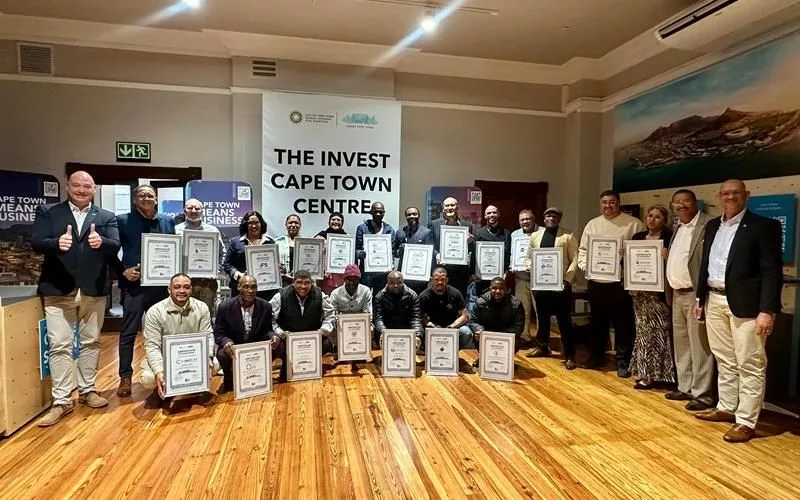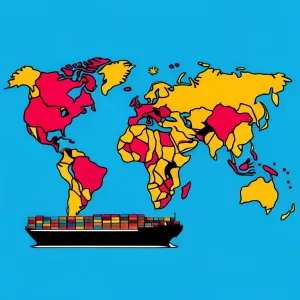Cape Town powers the growth of small businesses through strong citybacked programs that offer training, resources, and chances to connect with others. The High Impact Supplier Development Programme helps entrepreneurs learn practical skills like managing money and growing sales, while the annual SMME Showcase brings them together with investors and officials to build partnerships. Thanks to this support, many small businesses are thriving, creating jobs and fueling the city’s economy. The city’s ongoing commitment ensures these businesses keep growing, making Cape Town a vibrant place full of opportunity and innovation.
South Africa faces a big threat as the U.S. plans to add a 30% tariff on its goods, risking up to 30,000 jobs in farming, car making, and textiles. This could slow the economy and make life harder for many families. The government is working hard to find new trade partners, especially within Africa and Asia, to protect businesses and workers. While tensions with the U.S. rise, South Africa hopes its spirit and smart strategies will help it survive and grow in a tricky global world.
The Northam Social and Labour Plan (SLP) project is changing South African mining by focusing on the people, not just profits. After a long history of hardship and unfair treatment, mining companies now invest in local schools, health, and infrastructure to help communities grow strong and healthy. The recent Northam project rebuilt schools and provided meals, showing how mining can support education and future opportunities. This new way of working brings hope that mining will build a better future for everyone, not just extract wealth from the land.
In 2025, groceries in Johannesburg cost more than ever, with the average basket topping R5,656. Families struggle as prices for meat, vegetables, and cooking oil keep climbing, making it hard to afford basic meals. Many people now buy food in bulk or join cooperatives to stretch their money. Despite the challenges, communities show strength and creativity, finding new ways to share and support each other in a city where food means more than just eating it’s about survival and hope.
Siba Mtongana is a lively South African chef who brings new life to African food by mixing old, rich flavors with fresh, modern ideas. She shares her love for cooking through TV shows, restaurants, and books, making gourmet meals easy and exciting for everyone. Beyond cooking, Siba helps young chefs grow and celebrates African culture with pride. Her journey reminds us that food is more than taste it’s a way to tell stories, connect people, and inspire the world.
The United States has slapped a 30% tariff on many South African exports, making their goods more expensive and harder to sell in the US market. This sudden change hits important industries like citrus, wine, and steel, forcing businesses to scramble for new customers and government help. Despite the tough times, South African companies are showing grit and creativity, exploring new markets and finding fresh ways to survive. The government is working hard to keep talks open with the US, hoping for a fair solution without trade fights. Even with uncertainty ahead, South Africa’s spirit of resilience shines bright.
Cape Town has introduced a new cleaning levy to pay for keeping the city’s streets clean and improving infrastructure. While city leaders say it’s fair because wealthier residents pay more, many people and groups argue it’s unfair, possibly illegal, and adds extra financial pressure. A court case is underway, inspired by a similar ruling that struck down a sanitation fee in another city. This debate is about more than money it’s about fairness, trust, and how cities can grow without hurting their communities. The outcome will shape Cape Town’s future and may influence other South African cities too.
British Airways now lets travelers book entire flights to Cape Town using only Avios points, making longhaul trips easier and more affordable for loyalty members. Starting at 70,000 Avios plus fees, these special flights give families and frequent flyers a fair chance to secure seats during busy holiday times. This new option turns loyalty points into a real ticket to adventure, opening the door for more people to explore Cape Town’s stunning landscapes and rich culture. It’s a fresh, exciting way to travel that blends technology, reward, and exclusive access all while supporting local communities.
Bellville is ready to breathe new life into the Stikland site by turning it into a lively area with a modern longdistance bus station, shops, offices, and community spaces. This plan will make travel easier, help local businesses grow, and bring people together. City leaders want everyone from traders to commuters to join in shaping this exciting change. The project blends Bellville’s rich history with a bright future, aiming to create a place where everyone can work, shop, and connect.
Powering the Future: South Africa’s Bold Leap Toward Private-Led Transmission Expansion
South Africa is making a bold move by inviting private companies to help build and expand its electricity grid, aiming to fix old problems and bring in more clean energy. With a huge plan to add 14,000 kilometers of new power lines and a special fund to protect investors, the country wants to make power more reliable and green. This fresh approach will create jobs, open new markets, and connect sunny and windy places to cities hungry for clean energy. It’s not just about electricity it’s about building a brighter, fairer future for all South Africans.
South Africa is facing a big challenge as the United States plans to add heavy taxes on key minerals like gold, diamonds, and manganese. This threat could cost jobs and money because the US is one of South Africa’s biggest buyers. While platinum metals are still safe for now, the country worries about losing important markets. South Africa is exploring new ways to grow its economy, like processing minerals locally and finding new buyers, hoping to turn this crisis into a chance to build a stronger future.
Scooters Pizza was a beloved South African fastfood brand famous for its promise to deliver hot pizza in 39 minutes or it was free. It grew quickly in the 1990s and 2000s, capturing hearts with its bold guarantee and strong community ties. Families and kids eagerly awaited the red scooter deliveries, making it part of daily life and local culture. However, when global giant Domino’s arrived, Scooters struggled to keep up and eventually faded away. Still, its story lives on as a symbol of local pride, fast innovation, and the spirit of South Africa’s changing times.
Cape Town’s Infrastructure Revolution: Setting a New Benchmark for South African Cities
Cape Town is undergoing a big change with a huge R9.5 billion investment in 2024/25 to improve safety, water, energy, housing, and transport. The city is upgrading fire stations, water pipes, renewable energy, and building affordable homes, making life better and safer for everyone. New bus routes will connect far neighborhoods, opening up new chances for work and school. Cape Town’s bold plans are not just about buildings they are about creating a city where everyone belongs and can thrive. This fresh start shows how careful planning and action can transform a city and inspire others.
The Blouberg Potato Belt Development Programme is changing lives in Limpopo by helping farmers grow more potatoes with better tools, training, and irrigation. It supports over 700 hectares of farming, creates thousands of jobs, and brings in millions of rands each year, lifting many families out of poverty. Strong partnerships between government, businesses, and local leaders make this success possible, turning humble fields into symbols of hope and growth. Despite challenges, the community keeps pushing forward, showing how teamwork and hard work can build a bright future for rural South Africa.
Jane Sithole dreams of a South Africa where small businesses can grow freely without being trapped by endless rules and red tape. She wants fair policies that help all entrepreneurs, no matter their background, and urges the government to cut barriers and offer real support. Sithole believes that by working together and respecting every business owner’s challenges, South Africa can unlock its true entrepreneurial spirit and build a brighter economic future for everyone.
Minister Stella Ndabeni has launched a powerful plan to help small businesses all across South Africa grow and thrive. With nearly R3 billion set aside, her roadmap supports over a million micro, small, and medium enterprises through funding, training, and new technology access. She wants to break down old barriers that kept many entrepreneurs, especially in rural areas, from succeeding. By investing in skills, assets, and digital tools, the plan lights a bright path for local makers and dreamers to build stronger communities and a fairer economy for everyone.
















